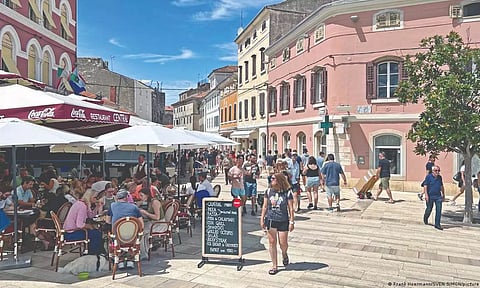

• JONAS MARTINY
Croatia is again a very popular travel destination, with visitor numbers this year expected to surpass the record set in 2019, according to the Croatian Tourism Ministry. There are several reasons for the 2023 boom: Croatia joined the Schengen zone in January, meaning that many European tourists are no longer subject to border checks when they enter the country. On top of that, Croatia has swapped out its old currency, the kuna, for the euro, making transactions more seamless for travelers from the eurozone.
“Compared to previous years and the pre-pandemic period, we have seen increased tourist numbers in the first half of 2023,” a ministry spokesperson told DW. He said the Schengen travel freedoms are making it easier for travelers to visit Croatia for a city break or weekend. Tourism already contributes up to 20% of Croatia’s gross domestic product, and it is increasingly becoming a pillar of the economy, especially in the coastal regions.
Joining the eurozone has led to greater transparency for vacationers, who can better judge if goods and services offered are value for money. In addition, uncertainties linked to exchange rate fluctuations are now a thing of the past. All this makes it easier to plan and budget for a Croatia getaway.
“Joining Schengen and the eurozone will considerably benefit the Croatian tourism industry,” the ministry spokesperson said. “Especially considering that about 80% of tourists staying in Croatia overnight come from the Schengen area and almost 60% hail from the eurozone.”
Yet these changes also have a downside, including recent reports of price hikes. Tourism authorities have attributed the higher prices less to joining the eurozone and more to global inflationary pressures. The ministry referred to studies finding that prices rose in other Mediterranean holiday destinations that have been part of the eurozone for far longer.
That said, the spokesperson acknowledged that “unfortunately, there have also been cases where the introduction of the euro has been used as a pretext to raise prices.” He promised Croatian authorities would monitor such “unfair practices.”
It’s not a surprise that Croatia is becoming an increasingly sought-after travel destination, with 1,880 km of Adriatic coastline, more than 600 islands and iconic towns like Dubrovnik. Yet mass tourism can cause serious environmental harm, for example in Croatia’s northern Istria region, which sees the most visitors by far. Conservationists with nonprofit Zelena Istra, Croatian for Green Istria, are concerned about this development.
The consequences of mass tourism are varied. It can overwhelm local infrastructure such as waste collection and recycling services. It may also spur the illegal construction of holiday resorts which can remain vacant for months, or the privatization of beaches, shutting out locals, according to Dunja Mickov of Zelena Istra. Mass tourism can cause biodiversity loss, pollute the air, sea and groundwater, Mickov told DW.